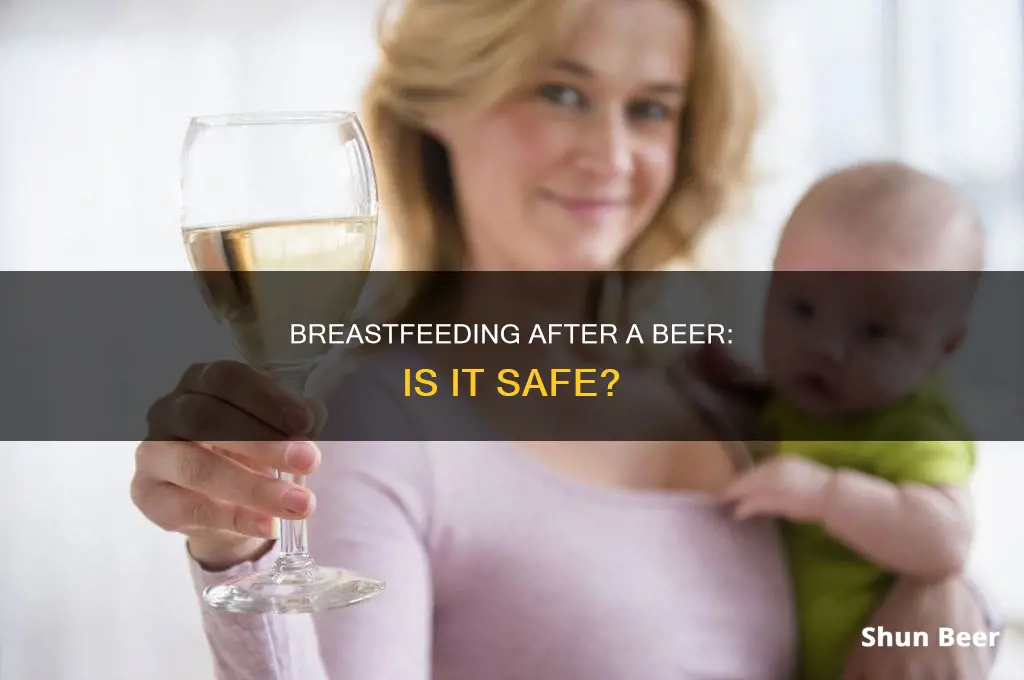
It is generally advised that breastfeeding mothers avoid drinking alcohol. However, drinking up to one standard drink per day is not known to be harmful to infants. Alcohol can pass into breast milk and subsequently into the baby when they feed. To avoid exposing the baby to alcohol, it is recommended to wait at least two hours after drinking before breastfeeding. The alcohol content in breast milk is similar to that in the blood, and the time taken to metabolise alcohol varies based on factors such as the amount of alcohol consumed, the speed of consumption, whether it was consumed with food, and individual physiology.
| Characteristics | Values |
|---|---|
| Number of beers considered safe while breastfeeding | 1-2 beers |
| Waiting time before breastfeeding | 2-3 hours |
| Impact on the baby | Sleep disturbances, decreased milk intake, impaired immune function, delayed motor development, potential impairment of cognitive development |
| Impact on the mother | Delayed milk ejection reflex, decreased milk supply |
What You'll Learn

How long after drinking beer can you breastfeed?
It is recommended that you wait at least two hours after drinking one beer before breastfeeding. This is because it takes around two hours for the average adult to metabolise one drink. If you've had two drinks, you should wait four to five hours.
The level of alcohol in your breast milk will be similar to the level in your blood. So, as your blood alcohol content drops, so does the alcohol content of your breast milk.
The time it takes for alcohol to leave your breast milk depends on a few factors, including:
- The amount of alcohol consumed
- How quickly the alcohol was consumed
- Whether the alcohol was consumed with food or on an empty stomach
- How much you weigh, and how fast your body can metabolise and break down alcohol
If you're breastfeeding, it's important to be cautious about drinking alcohol. While not drinking alcohol at all is the safest option, drinking up to one glass of alcohol per day is not known to be harmful to your baby. However, drinking more than this can negatively impact your baby's growth and motor function.
Steel Beer Glasses: Safe Choice?
You may want to see also

How much alcohol is safe to drink while breastfeeding?
It is important to note that not drinking alcohol is the safest option while breastfeeding. However, according to the Centers for Disease Control and Prevention (CDC), moderate alcohol consumption (up to one standard drink per day) is generally considered okay.
One standard drink is defined as:
- 12 oz. of 5% ABV beer (about one can)
- 8 oz. of 7% ABV malt liquor (around the size of a standard drinking glass)
- 5 oz. of 12% ABV wine (one glass)
- 1.5 oz. of 40% ABV (80-proof) liquor (one shot)
It is recommended to wait at least two to three hours after consuming one drink before breastfeeding. If you have two drinks, it is advisable to wait for four to five hours. The level of alcohol in your breast milk corresponds to the level of alcohol in your blood. Therefore, if you feel "neurologically normal" and no longer tipsy or buzzed, it is likely safe to breastfeed.
It is crucial to plan and time alcohol consumption to minimize the exposure of your baby to alcohol. You can breastfeed your baby immediately before consuming alcohol or express and store breast milk ahead of time. If your baby needs to be fed before the recommended waiting time has passed, use previously expressed milk or formula.
Excessive alcohol consumption can lead to negative consequences for both the breastfeeding parent and the baby. For the breastfeeding parent, it can interfere with the let-down reflex and reduce milk supply. For the baby, it can cause developmental and neurological problems, trouble sleeping, and difficulty gaining weight.
Beer and Heart Health: Can It Cause Irregular Heartbeat?
You may want to see also

How does alcohol affect breast milk?
Alcohol can pass into breast milk and subsequently be consumed by the baby. The general recommendation is to wait at least 2 hours after drinking a single alcoholic beverage before breastfeeding. This is because it takes about two hours for the average adult to metabolize one drink. However, it's important to note that the time it takes to metabolize alcohol can vary depending on factors such as the amount and type of alcohol consumed, the person's weight, and how quickly their body can metabolize alcohol.
The level of alcohol in breast milk closely parallels the level of alcohol in the blood. According to some sources, the highest alcohol levels in milk occur 30 to 60 minutes after consuming an alcoholic beverage. However, food delays the time of peak milk alcohol levels. Therefore, it is recommended to consume alcohol with food to slow the rate at which alcohol enters the bloodstream.
Exposing infants to alcohol through breast milk can have several negative effects. These include:
- Sleep disturbances, including shorter sleep periods, more frequent wakefulness, and less total active and REM sleep.
- Increased REM sleep in the period from 3.5 hours to 24 hours after exposure to alcohol.
- Decreased milk intake by the baby.
- Impaired immune function.
- Delay of motor development.
- Potential impairment of cognitive development.
- Reduction in the ability for abstract reasoning at school age.
It is important to note that regularly drinking above the recommended limits can be harmful to both the mother and the baby. Excessive alcohol consumption can decrease milk supply, cause sleep problems, and impact the baby's growth and development. Therefore, it is generally recommended to limit alcohol consumption to no more than one drink per day while breastfeeding.
Beer Temperature: Re-Chilling After Warming, Safe?
You may want to see also

What are the risks of drinking alcohol while breastfeeding?
Drinking alcohol while breastfeeding can have several risks for both the infant and the breastfeeding parent. Firstly, alcohol can pass into breast milk and reach the baby when they feed, with levels of alcohol in breast milk closely mirroring those in the parent's bloodstream. While an occasional drink is unlikely to harm the baby, regular drinking above the recommended limits can be harmful. For context, one standard drink is defined as 12 oz. of 5% ABV beer (about one can), 8 oz. of 7% ABV malt liquor (around the size of a standard drinking glass), 5 oz. of 12% ABV wine (one glass), or 1.5 oz. of 40% ABV liquor (one shot).
For infants, exposure to alcohol in breast milk can lead to several negative consequences. These include an increased amount of REM sleep in the period from 3.5 hours to 24 hours after exposure, decreased milk intake, and impaired weight gain. There is also a risk of future developmental problems, such as trouble with reasoning, delayed motor development, and impaired immune function. Additionally, alcohol can interfere with the milk-ejection reflex, leading to a reduced milk supply for the baby.
For the breastfeeding parent, alcohol can impair their judgment and ability to care for the child safely. It can also increase the time it takes to push out milk, known as the "let-down" or "milk ejection" reflex. Regular alcohol consumption can lead to a decrease in overall milk supply. Furthermore, drinking alcohol and breastfeeding simultaneously is not recommended, as it can negatively impact the baby's sleep and development.
To minimize risks, it is generally recommended to wait at least two to three hours after a single drink before breastfeeding. This allows time for the alcohol to leave the breast milk. It is also important to be mindful of factors such as the number of drinks consumed, the rate of alcohol consumption, and whether food was consumed alongside the drink. If possible, it is advisable to breastfeed before consuming alcohol or to express and save milk ahead of time.
Mixing Beer with Spirits: What's the Verdict?
You may want to see also

What are the signs that a baby has consumed alcohol via breast milk?
While it is generally recommended that you avoid drinking alcohol while breastfeeding, an occasional drink is unlikely to harm your baby, especially if you wait at least 2 hours after drinking before feeding. However, if your baby has consumed alcohol via breast milk, there are some signs you can look out for.
Firstly, alcohol may change the taste of your breast milk, and your baby may not like it. They may also show an increase in crying, become drowsy, or experience lethargy, sickness, nausea, vomiting, and trouble sleeping. Research suggests that even short-term exposure to alcohol in breast milk can impact a baby's sleep and reduce their overall sleep time.
Furthermore, long-term exposure to alcohol in breast milk could have more serious negative effects on your baby's growth, cognition, and development. This is because newborns have immature livers that cannot effectively metabolize alcohol. Some potential long-term consequences include delayed development, impaired immune function, weakness, and decreased weight gain.
Therefore, it is important to be mindful of the amount and frequency of alcohol consumption while breastfeeding. If you are concerned about your alcohol intake or notice any of the mentioned signs in your baby, it is best to consult with a healthcare professional, such as your GP or a lactation consultant.
Beer and Rifampin: Safe or Not?
You may want to see also
Frequently asked questions
Yes, but it is recommended to wait at least 2 hours after drinking.
It is generally recommended to wait at least 2 hours after drinking alcohol before breastfeeding. This is because it takes around 2 hours for the average adult to metabolise 1 drink.
Drinking large amounts of alcohol while breastfeeding can be harmful to your baby. It can cause negative effects on your baby's development, growth, and sleep patterns. It can also decrease your milk supply and impair your judgment, compromising your baby's safety.
Drinking alcohol can interfere with the levels of prolactin, a hormone that helps produce milk. It can also delay the let-down reflex, which is a hormonal reaction that allows your body to eject milk. As a result, you may produce less milk than usual.
Here are some tips to increase safety when drinking alcohol while breastfeeding:
- Breastfeed your baby immediately before drinking any alcoholic beverage, or pump and save your milk.
- Limit your alcohol intake to one drink per day.
- Wait at least 2 hours after drinking before breastfeeding your baby.
- If your baby needs to be nursed before the 2 hours are up, use previously expressed milk.
- Drink juice and eat food while drinking alcohol to slow the rate at which alcohol enters your bloodstream.







